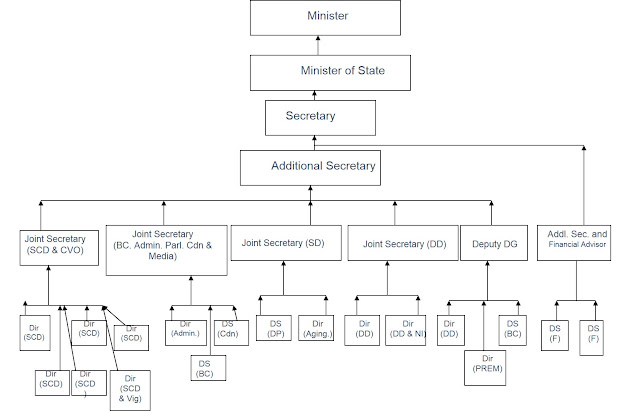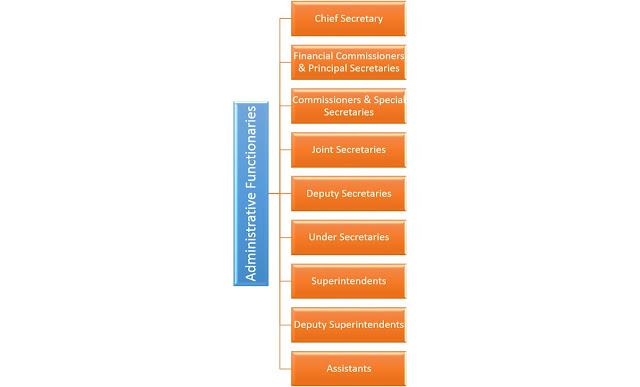Corruption
and Public Financial Management
By Lalit Kumar.
The Government ensures the
administration over citizens as per the rules laid by legislature and provides
the public services, security through armed forces, and justice through
judiciary services. How the Executive System works in Government of India?
The executive system ensures the
control over corruption in providing goods and services through Government
Organizations. It ensures availability of goods and services for fulfillment of
basic needs of the public or citizens. It regulates all sectors of the economy
and also ensures control over the State Governments.
Each State Government further
functions to ensure proper governance in providing goods and rendering public
services:
The ultimate goal of political and
administrative functionaries in Centre as well as in States; is to ensure
quality service delivery to the citizens. The Constitution also directs to
fulfill the needs of citizens through political and administrative setup. The
administrative setup includes the following:
The Chief Secretary is the head of
administration and there are Additional Chief Secretaries work under him for
one or multiple Government departments. In most of the States, there is Human
Resource Management System (HRMS) working to establish these functions more
effectively.
Each field office works with
commitment towards achievement of a common goal provided by their
administrative secretaries:
Each field office works towards individual
excellence and with trust over each other to get the benefit of collective
functions. The team-spirit and motivation works in groups and the instructions
are passed by Commissioners and Deputy Commissioners by organizing meetings,
workshops, and giving written directions through orders.
Role of Accounts Administrator:
The role of Accounts Administrator
has become more challenging due to increase in financial irregularities and
involvement of external bodies in ensuring good governance through using
information technology. The corruption is usually originated by involving the
employees of an organization. Earlier it was considered that employees provided
higher salary packages don't make corruption but the scams through involving
banking officers in case of PNB scam and Rotomac scam had proved it wrong. The misuse
of public funds, bribery, and means of abusing office; are most prominent
issues in financial administration for each state government in India. The
Administrative Training Institute (ATI) i.e. Haryana Institute of Public Administration
(HIPA) and the Chief Secretary Office have been putting full efforts to sort
out the problems relating to corruption in public offices. The corruption in
itself contains either the ways to divert public resources for private or
personal uses or abusing of authorities for personal interests.
The Public Financial Management (PFM)
It explains the managerial aspects
relating to acquisition of public resources, safeguarding pubic resources, and
effective & efficient utilization of public resources. It comprises the systems
of revenue collection, assets and debt management, budget preparation and
execution, preparing and maintaining accounts, internal and external control
for effective compliance of budget and audit mechanisms. In case, the PFM is
strongly enforced, there will be very little scope of corruption. In other
words, it is relaxation in PFM that generate the conditions for happening of
corruption.
Wherever the financial rules have not
been defined and enforced; the officers take decisions with their discretion
and such discretion gives scope for corruption. Wherever the control mechanisms
are absent or unavailable, the utilization of resources may lead to corruption
by increasing the probability of individuals to be engaged in corruption
practices like theft, misuse of resources, and abusing powers for personal
interests. Wherever the executives are incompetent or less qualified as per the
requirement; others including employees, citizens, and other stakeholders
become empowered to get benefit from the in-competencies of the
executives. If there is more potential for happening of corruption, then
definitely there is weak public financial management system.
The only key solution to corruption
in public organizations is to develop effective PFM systems, refine PFM
systems, and strengthening transparency, accountability, and enforcement.
Understanding Group Dynamics for Success:
The executives are trusted to perform their duties by taking
work from others. The principle of success in each department is, “You can
accomplish anything in life provided you don’t mind who gets the
credit”. The civil servants are trained in training institutes to share their
abilities to the subordinates and getting work in best ways. They are trained
to make a difference and leave their footprints in the sand for others to
follow.
There are seven Cs to get success in each
government office i.e. Commitment towards Goals, Competence to achieve goals,
Character to stay work hard in office, Compassion to deliver continuous
effective results, Credibility to get the work done from others, Clarity on
what to do and what not to do, and Courage to deliver 100% in each function.
*Copyright © 2018 Dr. Lalit Kumar. All rights reserved.


















